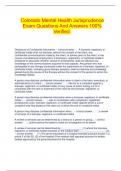Colorado Mental Health Jurisprudence
Exam Questions And Answers 100%
Verified.
Disclosure of Confidential Information - correct answer. A licensee, registrant, or
certificate holder shall not disclose, without the consent of the client, any
confidential communications made by the client, or advice given to the client, in the
course of professional employment. A licensee's, registrant's, or certificate holder's
employee or associate, whether clerical or professional, shall not disclose any
knowledge of the communications acquired in that capacity. Any person who has
participated in any therapy conducted under the supervision of a licensee, registrant, or
certificate holder, including group therapy sessions, shall not disclose any knowledge
gained during the course of the therapy without the consent of the person to whom the
knowledge relates.
A person may disclose confidential information when a client or the heirs, executors, or
administrators of a client... - correct answer. ...file suit or a complaint against a
licensee, registrant, or certificate holder on any cause of action arising out of or
connected with the care or treatment of the client by the licensee, registrant, or
certificate holder
A person may disclose confidential information when a licensee, registrant, or certificate
holder... - correct answer. ...was in consultation with a physician, registered
professional nurse, licensee, registrant, or certificate holder against whom a suit or
complaint was filed based on the case out of which the suit or complaint arises
A person may disclose confidential information when... - correct answer. ...a review
of services of a licensee, registrant, or certificate holder
A review of services can be determined by a board or a person or group... - correct
answer. ...authorized by the board to make an investigation on its behalf
A review of services can be determined by ________________(1) where the licensee,
registrant, or certificate holder practices or the medical staff ____________________(2)
- correct answer. (1) The governing board of a hospital licensed pursuant to part 1 of
article 3 of title 25; (2) of the hospital if the medical staff operates pursuant to written
bylaws approved by the governing board of the hospital
, A review of services can be determined by __________________ if the person has
signed a release authorizing the review - correct answer. A professional review
committee established pursuant to section 12-245-212 (1)
A person may disclose confidential information when _________________ a school or
the occupants of a school. - correct answer. A client, regardless of age, makes an
articulable and significant threat against
A person may disclose confidential information when a client, regardless of age, exhibits
behaviors that, in the reasonable judgment of the licensee, registrant, or certificate
holder... - correct answer. ....create an articulable and significant threat to the health
or safety of students, teachers, administrators, or other school personnel.
A licensee, registrant, or certificate holder who discloses information under this
subsection (2)(d)...
hint: (2)(d) = disclosing information from a client, regardless of age. - correct answer.
...shall limit the disclosure to appropriate school or school district personnel and law
enforcement agencies. School or school district personnel to whom the information is
disclosed shall maintain confidentiality of the disclosed information, regardless of
whether the information constitutes an education record subject to FERPA, consistent
with the requirements of FERPA and regulations and applicable guidelines adopted
under FERPA, but may disclose
information in accordance with section 1232g (b)(1) of FERPA and 34 CFR 99.36 if
necessary to protect the health or safety of students or other persons.
A licensee, registrant, or certificate holder who discloses or fails to disclose a
confidential communication... - correct answer. ...with a client in accordance with
this subsection (2)(d) (A client regardless of age) is not liable for damages in any civil
action for disclosing or not disclosing the communication. This subsection (2)(d)(III)
does not rescind any statutory duty to warn and protect specified in, and does not
eliminate any potential civil liability for failure to comply with, section 13-21-117.
Subsection (2)(d) does not apply to...
hint: (2)(d) = disclosing information from a client, regardless of age. - correct answer.
...an education record that, under FERPA, is exempt from the HIPAA privacy rule.
Subsection (2)(d) applies to covered entities, as defined in HIPAA as...
hint: (2)(d) = disclosing information from a client, regardless of age. - correct answer.
"Articulable and significant threat" means a threat to the health or safety of a person
that, based on the totality of the circumstances, can be explained or articulated and that
constitutes a threat of substantial bodily harm to a person.




